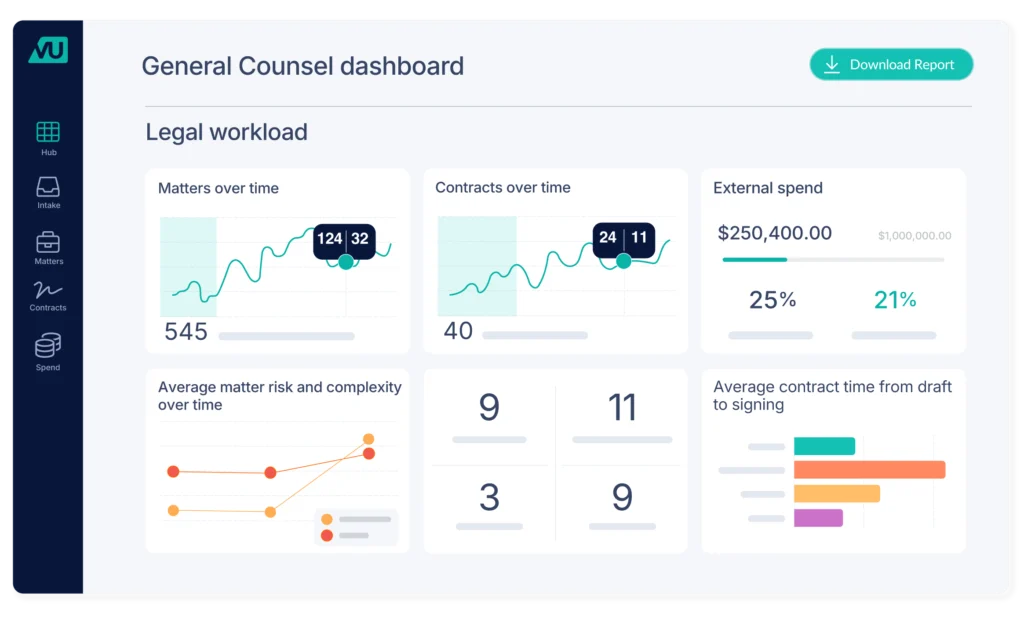Data-driven legal leadership – how to elevate your in-house legal function

This article was created from a webinar hosted by In-house Connect in which David Lancelot, CLO and EVP Advocacy at LawVu, and Hayley Day, Senior Director at Morae, explored the “why” behind data-drive leadership. Click here to replay the webinar.
In today’s digital era, leveraging data has become a fundamental aspect of almost every business operation and in-house legal function. As a result, the role of a legal leader now extends beyond traditional legal oversight.
Running your legal function successfully carries increasing expectations and opportunities to use legal data, metrics and insights to prove impact, improve operations and engage successfully with your data-centric business peers.
In short, whether you’re a corporate counsel, chief legal officer or a legal operations leader, understanding how to leverage legal data effectively can transform the way you are perceived by the business and boost your legal department’s performance. And, importantly, it’s no longer a ‘nice to have’ for modern legal leaders, it’s become an essential component of your work tool kit.
However, getting started can be a challenge: identifying the right metrics for your team and business, knowing how to communicate with data, and finding a way to navigate a process that is often burdened with manual work and difficulty accessing data, are common concerns for General Counsel and other legal leaders.
In discussing the ‘why’ behind data-driven leadership, David Lancelot and Hayley Day talked about the evolving landscape and expectations for using metrics and offered practical strategies to elevate your legal team’s effectiveness and enhance your career development. From their discussion, we highlight three actionable takeaways that legal leaders can use to kick-start utilizing data in their roles and set critical data foundations for the future.
Understand the fundamentals of data and in-house legal metrics:
While comprehensive knowledge of the law and regulations, negotiating skills, specializations, and ability to act as business advisors to the CEO and senior leadership team are a given for legal leaders, comfort with data and analytics – including common tools and terminology – may not be.
“They didn’t teach this in law school, and they certainly didn’t teach us this in a law firm. You go into a company and it’s okay, everybody’s using this terminology. As in-house lawyers, it’s great for us to have this sort of foundation in order to operate at the business level.” – David
According to David and Hayley, the definitions and key terms to help legal leaders get the foundations of legal data right include:
- Data: Any collection of facts, figures or information that is recorded, stored and used for analysis or decision-making.
- Metric: Measures of quantitative assessment commonly used for assessing, comparing and tracking performance or production.
- KPI: Key Performance Indicator is a quantifiable measure of performance over time for a specific objective.
- OKR: Objectives and Key Results are the results and outcomes of actions on the KPIs you set (usually at the org/business unit level).
- Benchmark: How your department compares to other departments in the company and externally (with other legal departments in similar industry/size).
- Insight: Immediate and clear understanding (seeing the solution to a problem or the means to reaching a goal).
David and Hayley emphasized the importance of considering how each of these points relates to the other and the value in finding the best way to leverage them.
A key takeaway? Think about the value each can convey in the specific context of the ways your team supports business goals.
“Not all data is created equally, nor is it crystal clear. But all of the things that we do with our data efforts give us insight into who we are as professionals, who we are as a legal department, who we are as a business partner, and who we are as a strategic partner at the leadership table.” – Hayley
Tip: To learn more about establishing KPIs and how to get started with data for your legal department, here’s a handy guide!
Aspire to build a data-driven culture in your legal team
By making decisions based on data rather than gut feelings or intuition, in-house legal teams can reduce risk, enhance efficiency and elevate their perceptions of the business. However, not all legal experts have an interest in data, never mind a deep understanding of how to leverage it or how it can advance their in-house practice. And many teams are only at the start of their data journey. Therefore, patience is required if data is to truly deliver on its potential, and it’s critical that legal leaders build a data-driven culture that can evolve over time.
“We’re very early for most legal teams and their progress to becoming a truly data backed legal function… we’re just starting the movement from internal facing metrics – which you still need to manage your function – to more external facing metrics, which allow you to be a participant in the strategy of the business.” – David
Four ways to help establish a data-driven culture and future-proof your legal department:
- Lead by example: Legal leaders must integrate data into their own strategy, decision-making processes and responsibilities. Building and demonstrating a data-driven approach will inspire teams to follow suit.
- Invest in education: Knowledge is power, especially when it comes to handling data. Legal leaders should prioritize learning about data management, analysis and interpretation, and support their teams’ ability to learn about and use key metrics in their work.
- Incorporate data into daily operations:.Using data regularly helps identify patterns and predict future outcomes, enabling proactive measures. Seeing data used regularly for multiple purposes and use cases reinforces its value and importance, as well as creating learning opportunities.
- Communicate: Regularly survey business partners for feedback and align your data and communications to their objectives
“People are sometimes afraid to get feedback because they’re afraid of what their business partners might say. But it really can help you strengthen that relationship, strengthen that transparency and open-door policy for your business partners and internal customers.” – Hayley
Once you start using data, continuing to foster a data-driven mindset is crucial for forward momentum – celebrating data-driven successes and acknowledging contributions helps to reinforce the importance of this cultural shift.
Tip: To learn more about a data-driven culture that focuses on the impact of your team and function, check out this free course that’s part of the Connected Legal Certification.
Embrace legal technology
Put simply, adequate software designed for legal functions can make data capture – and therefore your ability to use data in increasingly sophisticated and valuable ways – a lot simpler and more efficient. Or even possible!
“Having a system in place that allows you to analyze and visualize KPIs in real time, without having to call on different parts of the business to get you that information… that’s how you are able to manage the function in a much more modern and effective manner.” – David
How to approach technology to support a data-driven legal leadership strategy:
- Find practical ways to start: Many teams are tracking several key metrics already in some form, even if only using Excel or manual collection. Even if you don’t have dedicated technology, you can still use data and metrics to build an understanding of what will resonate and be useful to your team and business and then use that knowledge to inform your technology requirements.
“Knowing where the sources of data are gives you the power and knowledge to make the next move in modernization, which is ultimately going to be to automate collecting that data.” – Hayley
- Think about data and service delivery in tandem: While implementing technology has a huge impact on your ability to become data-driven, it also strengthens the service you provide to your business partners. This is particularly true when you invest in an intake system that lives outside of email and spreadsheets, where things can easily get lost or slowed down by manual processes. When making a business case for investments in legal technology, make your presentation more compelling by highlighting outcomes like improvements in service delivery and what’s going to be possible with your data.
Tip: Use this business case template to showcase the value of legal technology and the opportunities inherent in bringing legal data to the business.
- Consider consolidated, easy-to-use technology to get better data. A holistic view of your legal work and metrics will truly communicate your value and help you to make good operational decisions. But consolidating data from disparate systems takes a lot of time and effort. One of the greatest advantages of technology that manages multiple workflows is that it has data and reports for the multiple types of work you do without requiring extra effort from you to bring it together for analysis and stakeholder communication.

The General Counsel dashboard in the LawVu legal workspace
- Use visualization to your advantage: One of the best ways to engage people with your data is through simple visual presentation. Visualization is powerful because it helps people see and understand insights and key information quickly, and it’s also often the “language the business communicates in”. Therefore, a General Counsel who can come to the table with dashboards is much more likely to show up in the same way their peers in other functions do.
“How you visualize your data can be a game changer. Through working with a lot of legal operations professionals, I have found that their dashboards are, of course, of peak interest to them because most of them are data junkies, but they really get their GCS and their practice area heads jazzed up about what their team is doing. Dashboards are great – not only for you to see at your fingertips a command center, it’s also great for you to have them on display when you’re doing your leadership presentations.” – Hayley
The rise of data-driven leadership for in-house leaders
Data-driven leadership is no longer a buzz-phrase restricted to tech industries. Legal leaders are increasingly recognizing its value in decision-making and strategic planning. As David and Hayley point out, data-driven approaches can enhance transparency, accountability and efficiency within legal teams. For legal leaders, adopting these practices means moving beyond intuition-based decisions to more informed, evidence-based actions, and it is also a critical step on the journey to becoming a more modern and effective legal leader.
The future of legal leadership isn’t just about knowing the law –it’s about mastering the tools and datasets that drive smarter business outcomes.
“I can see a day where there’s a discussion of leadership management operations and technology on the bar exam because it is so fundamentally important to how we run a law firm or an in-house legal function.” – David
Click here to watch the webinar on-demand.
About the speakers
David Lancelot is the CLO and EVP of Advocacy at LawVu, where he channels his passion for developing scalable, highly engaged legal functions in high-growth, global businesses. His distinguished career spans Silicon Valley, Europe and beyond. David has honed his expertise in scaling technology businesses and their legal frameworks, successfully navigating through hyper-growth, mergers, acquisitions and more.
Hayley Day, Senior Director at Morae, has spent more than a decade collaborating with law firms and corporate legal departments to drive strategic transformation initiatives and serve as a trusted business partner. With a strong focus on change management and the implementation of technology solutions, she excels at eliminating operational inefficiencies and aligning legal processes with business objectives.



